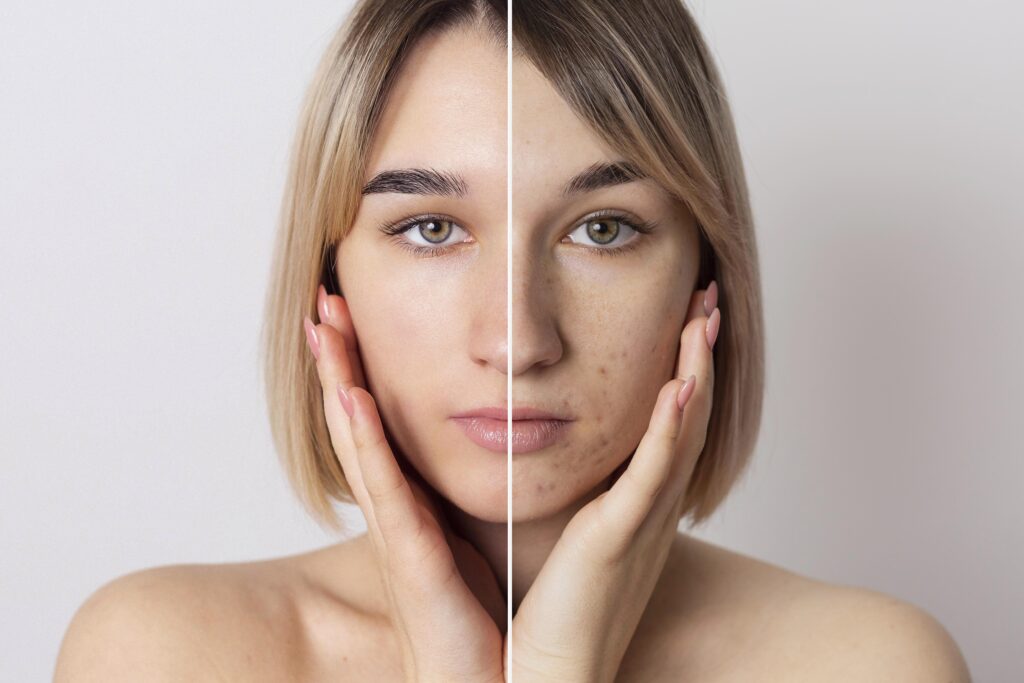
Vitamins play an essential role in maintaining overall well-being as it supports everything from immune function to cellular support. When our body lacks vitamins, it can manifest in many ways, including noticeable changes in our skin.Vitamin deficiencies can cause a variety of skin issues, including dryness, acne, and premature aging, affecting both appearance and comfort.
In this blog post, we will explore how deficiencies in specific vitamins affect skin health, identify the key vitamins involved, and offer practical solutions to address these deficiencies and promote healthier, more radiant skin.
Table of Contents
ToggleHere are some vitamin deficiencies that can affect your skin health-
1. Vitamin A Deficiency
Vitamin A deficiency can cause several skin issues, including dryness, flakiness, acne, and a dull complexion. This deficiency is frequently caused by a low-vitamin A diet or inadequate absorption issues.
Essential sources of Vitamin A include-
- Carrots
- Sweet potatoes
- Spinach
- Liver
To address the deficiency it is important to include vitamin A source foods in your diet and it is also essential to address if there are any underlying abortion issues that might be affecting your body’s ability to absorb this vital nutrient effectively.
2. Vitamin C Deficiency
Vitamin C deficiency can cause several skin problems, including scurvy, dark spots, and uneven skin tone. This deficiency is often triggered by a diet low in fruits and vegetables, as well as smoking, which depletes Vitamin C levels.
Vitamin C-rich foods-
- Citrus fruits
- Bell peppers
- Strawberries
- Broccoli
Also, including vitamin C rich foods in your diet can help replenish your levels and improve skin health.

3. Vitamin D Deficiency
Vitamin D deficiency can cause increased skin sensitivity and slower wound healing. This deficiency is frequently caused by a lack of sunlight and a poor diet. To address this, increase your exposure to sunlight, which allows your body to naturally produce Vitamin D.
Vitamin D rich foods-
- Fatty fish (salmon, mackerel, sardines)
- Fortified dairy products (milk, yogurt)
- Egg yolks
- Fortified cereals
- Sunlight (for natural production)
In some cases, Vitamin D supplements may be required to meet daily requirements and maintain skin health.
4. Vitamin E Deficiency
Vitamin E deficiency in the skin can cause premature aging and rough texture. This deficiency is frequently caused by malabsorption disorders or poor dietary intake.
Foods rich in Vitamin E-
- Nuts
- Seeds
- Spinach
- Avocados
To combat deficiencies, increase your intake of these foods and, if necessary, take Vitamin E supplements to support skin health and overall well-being.
5. Vitamin B2 (Riboflavin) Deficiency
Vitamin B2 (Riboflavin) deficiency can cause visible skin issues, such as cracks in the corners of the mouth and a sore throat. This deficiency is frequently caused by a poor diet low in riboflavin-rich foods or certain medical conditions that impair nutrient absorption.
Riboflavin-rich foods into your diet-
- Eggs
- Dairy product
- Lean meats
In addition, taking riboflavin supplements can help you meet your nutritional needs while also improving your skin health.

6. Vitamin B6 Deficiency
Vitamin B6 deficiency can cause dermatitis, eczema, and dry skin. This deficiency is frequently caused by an inadequate diet or specific medical conditions that prevent nutrient absorption.
Vitamin B6-rich foods-
- Poultry
- Fish
- Bananas
- Chickpeas
If dietary changes are insufficient, Vitamin B6 supplements can help restore adequate levels and improve skin health.
7. Vitamin B12 Deficiency
Vitamin B12 deficiency can cause visible skin changes such as paleness, jaundice, and rashes. These symptoms arise because Vitamin B12 is essential for red blood cell production and skin cell health.
Individuals following vegetarian or vegan diets are especially vulnerable because this vitamin is primarily found in animal products such as meat, dairy, and fortified cereals. Absorption problems, such as those caused by specific gastrointestinal conditions, can also contribute to a deficiency. To address this, dietary changes are necessary, such as incorporating B12-fortified foods or taking supplements, particularly for those who avoid animal products.
Conclusion
To summarize, understanding the effects of vitamin deficiencies on your skin is critical for maintaining a healthy complexion. We’ve discussed how deficiencies in essential vitamins A, C, D, E, and B can cause a variety of skin problems, ranging from dryness and premature aging to more serious conditions such as dermatitis and eczema.
Maintaining a well-balanced diet rich in these essential nutrients is critical for preventing these issues and promoting overall skin health. If you suspect a deficiency, consult a healthcare provider for personalized advice and testing to ensure that your skin and body receive the nutrients they require.
FAQS
Vitamin deficiencies can cause specific skin symptoms such as dryness, rashes, or slow wound healing. If you have persistent skin problems that do not respond to standard skincare treatments, you should consider a vitamin deficiency as a potential cause. Consulting with a healthcare provider and getting blood tests can help you identify any deficiencies.
While supplements can help with deficiencies, they should be combined with a well-balanced diet rich in essential vitamins. Food sources contain additional nutrients and compounds that work together with vitamins to promote overall health. Always consult with a doctor before starting any new supplement regimen.
Acne is frequently associated with a lack of vitamin A, which is essential for skin cell production and turnover. Lack of Vitamin A can cause clogged pores and acne. Increasing your Vitamin A intake through diet or supplements (under professional supervision) may help alleviate acne symptoms.
Improvements in skin health following treatment for a vitamin deficiency can vary depending on the severity of the deficiency and your overall health. Some people may notice changes within a few weeks, while others may wait a few months. Consistency in diet, supplementation, and skincare is essential for achieving the best results. symptoms.
A well-balanced diet can often prevent the majority of vitamin deficiencies that cause skin problems. However, absorption issues, medical conditions, or specific lifestyle choices (e.g., vegetarian or vegan diets) may still result in deficiencies. Regular check-ups and blood tests can help ensure that you are consuming the proper nutrients. achieving the best results.